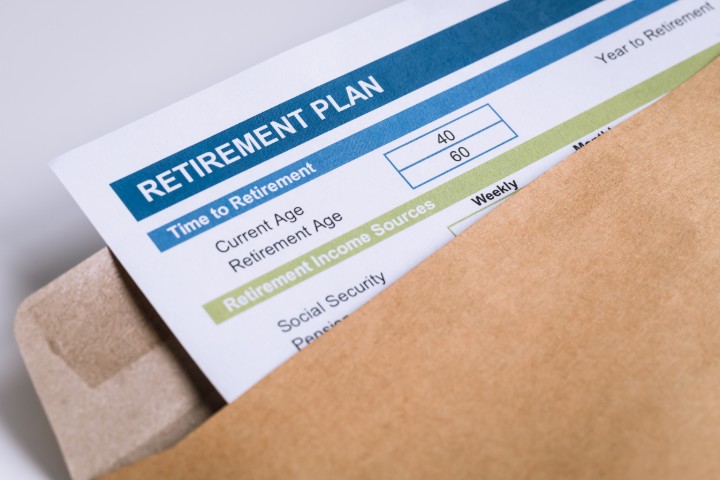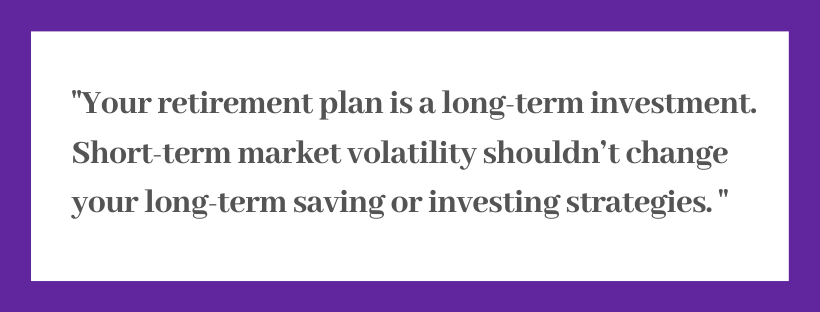The first few months of 2020 have been chaotic. We’ve experienced the spread of the novel coronavirus, a stock market decline, business closures, reduced hours, and mass remote work. You may be wondering what, if anything, you should be doing with your 401(k) during this period.
We all are experiencing a high level of stress and anxiety these days. For some, thoughts of retirement seem a distant dream, especially when we are concerned with day-to-day expenses and our family’s health. Especially for those close to retirement, this current market uncertainty may cause anxiety and concern. Here are a few things you can do to make the best of the situation.
Focus on the long-term
We are surrounded by 24/7 news, which can increase our anxiety about the market. Don’t let headlines drive your investment strategy. Resist the knee-jerk emotional reaction to sell investments or try to time the market. Your retirement plan is a long-term investment. Short-term market volatility shouldn’t change your long-term saving or investing strategies. Retirement strategies should be based on your personal situation, goals, risk tolerance and time horizon until retirement.
It is natural to have swings in market pricing, both up and down. Keep in mind that volatility works in both directions, and it is upside volatility that generates strong returns. The largest upward movements in stock prices often occur following steep market declines.
Control what you can
Over the long term, your actions – not the market – have the greatest impact on whether you reach your retirement goals. Maximizing your deferral contributions has the largest single effect on your retirement outcome. Just as important, stick to your long-term strategy. Remember that when the markets decline, your retirement plan contributions buy more shares for the same dollar amount invested. While it can be difficult to control your emotions during stressful times of market volatility, it is best to resist the urge to deviate from your long-term plan by prematurely selling investments at what could be market lows.
Know what options you have under your retirement plan
Your retirement plan is a vehicle for you to save for the future, but sometimes life gets in the way. You may find yourself struggling financially with day-to-day expenses as a result of this pandemic, and the money you’ve already saved in your retirement plan may help you through this emergency. It’s important to know what your options are under your plan, as well as their impact on your financial and tax situation.
Your retirement plan may allow for distributions if you experience certain hardships, such as unreimbursed medical expenses, or to prevent certain hardships, such as eviction or foreclosure. This distribution is limited to only what you need, and it is included in your taxable income for the year.
You may be able to take a loan against your 401(k) account. You pay yourself back via loan payments withheld out of your paycheck. Loans are not subject to federal or state income tax, unless you default on the loan, and they usually must be paid back within five years.
How the CARES Act may affect your retirement plan
The Coronavirus Aid, Relief, and Economic Security Act (CARES Act) was passed on March 27, 2020, providing financial aid for individuals and businesses in response to the COVID-19 pandemic. If you, your spouse or your dependent have been diagnosed with COVID-19, or if you have suffered adverse financial consequences as a result of a quarantine, furlough, lay-off, reduction in work hours, business closure, or the lack of childcare, the CARES Act may provide some relief. Each retirement plan is different, so the options available to you will depend on the terms of your plan.
The CARES Act allows plans to add a distribution option up to $100,000 for qualified participants. This distribution is not subject to the 10 percent early withdrawal penalty, but it is still subject to federal and state income tax.
If you have an outstanding loan from your 401(k) account, the CARES Act also allows plans to suspend outstanding loan payments for up to a year for participants who qualify and request the suspension. The loan would be re-amortized, and interest would still accrue, but you would have additional time to repay the loan. Keep in mind, if you have an outstanding retirement plan loan, and your employment ends (voluntarily or involuntarily), your loan may default and be considered taxable income.
For those over age 70½, the CARES Act waives the Required Minimum Distribution (RMD) for 2020.
Each retirement plan is different, but if you find yourself struggling with a financial emergency, you may want to discuss your options with your retirement plan administrator. Remember, any money you take out of your 401(k) plan now to cover an emergency is money that’s not invested and set aside for your retirement. If you are in a position to leave your retirement plan untouched, continue focusing on the long-term and control what you can.
Keep in mind, we are stronger than we think, and we will get through this rocky time.









 Equal Housing Lender. SBA Preferred Lender. NMLS #440379
Equal Housing Lender. SBA Preferred Lender. NMLS #440379